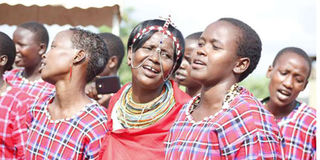Women have a right to a dignified life

Elderly Ilchamus woman (centre) joins girls in a dance at Ngambo Secondary School in Baringo South on November 28, 2015 during the celebration to mark the pass out of 180 girls who underwent alternative rite of passage. PHOTO | CHEBOITE KIGEN | NATION MEDIA GROUP
What you need to know:
- Female circumcision, is one of the most severe forms of gender based violence.
- It violates women’s rights to health, security and physical integrity, the right to be free from torture and cruel, inhuman or degrading treatment, and the right to life when the procedure results in death.
- The practice kills the dream of many girls — of getting an education; marrying when they choose; controlling their bodies and their lives.
The world is marking the International Day of Zero Tolerance to Female Genital Mutilation on Saturday.
Here in Kenya, the day will be marked in Tot, Elgeyo Marakwet County with several other activities planned for other hotspots in Samburu, Kajiado, Isiolo, Tharaka Nithi and Garissa.
FGM, also known as female circumcision, is one of the most severe forms of gender based violence. It is a gross violation of women’s rights and rights of the child.
It violates women’s rights to health, security and physical integrity, the right to be free from torture and cruel, inhuman or degrading treatment, and the right to life when the procedure results in death.
The practice kills the dream of many girls — of getting an education; marrying when they choose; controlling their bodies and their lives; of becoming anything they choose to be.
According to the recently launched Kenya Demographic and Household Survey 2014, at least 9.3 million girls and women in Kenya have undergone it, accounting for 6.64 per cent of the estimated 140 million girls and women who have been cut worldwide.
It continues to be practised with impunity despite the existence of international conventions and national statutes that prohibit it.
The Bill of Rights in the Constitution guarantees the protection of every child from abuse, neglect, harmful cultural practices, all forms of violence, inhuman treatment and punishment, and hazardous or exploitative labour.
GENDER BASED VIOLENCE
The Children’s Act 2001, the Sexual Offences Act 2006, the Prohibition of FGM Act 2011 and the Prevention Against Domestic Violence Act outlaw specific forms of violence against women and girls. So does the national policy for prevention and response to gender based violence.
The establishment of the National Gender and Equality Commission in 2013 and the Anti-FGM Board to spearhead gender issues and coordinate the fight respectively attest to the government’s commitment to eliminate gender based violence.
In view of the pervasive nature of the practice, the government has employed multi-pronged strategies that involve many players such as religious leaders, community based organisations, non-governmental organisations, and professionals from communities practising the rite of passage.
Aggressive awareness-creation, sensitisation and education campaigns, and promotion of alternative rites of passage have been carried out in many of the 17 counties regarded as hotspots. An estimated 10,000 girls have gone through the alternative rite since January 2014.
CHIEFS CHARGED IN COURT
The government has also established gender desks in all police stations. To date, over 150 people, including chiefs, have been charged in court or are being investigated for either practising or abetting female circumcision.
Scores have been sentenced for up to five years imprisonment.
All these have contributed to a decline in the mutilation, which now stands at 21 per cent, down from 27 per cent in 2009, according to the national Survey. This decline is among the highest recorded in the world during this period.
Although the fight against female circumcision is beginning to yield positive results, there are still cases of resistance and difficulty in gathering evidence and witnesses to testify.
I am confident that with uncompromising will and leadership, sustainable partnerships, a robust legislation, support of our partners and enhanced community mobilisation that aims at changing the social norms that drive the practice, we shall eliminate female circumcision and all other forms of gender based violence in our society in the coming days.
The writer is the Cabinet Secretary, Ministry of Public Service, Youth and Gender Affairs





